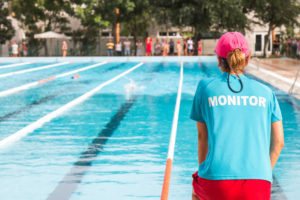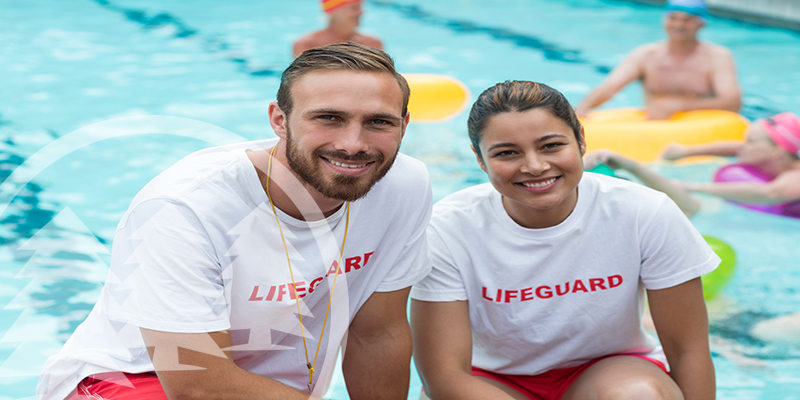When it comes to HOA pool safety, a common question often comes to mind: “Is having an HOA lifeguard necessary?” The answer, unfortunately, isn’t as simple as yes or no. There are many things to consider when making a decision.
The Pros and Cons of an HOA Lifeguard
The most obvious benefit of having a lifeguard on duty is safety. Drowning is a big issue. In fact, in the United States alone, more than 3,500 people die from unintentional drowning each year.
You want a trained and certified HOA lifeguard to patrol your community pool and keep residents safe. A lifeguard can prevent accidents from happening and save swimmers in the event of a drowning. This protects both your residents from danger and your association from liability.
Additionally, if you hire your lifeguard through a vendor, that vendor usually has the proper insurance coverage that will also keep your HOA from legal trouble. For example, if something happens in the pool area, your vendor will be able to provide a defense and indemnifications to your association. If you don’t hire a lifeguard through a service, your HOA will need to seek proper lifeguard insurance.
On the other hand, there are also drawbacks to hiring an HOA lifeguard. Professional lifeguards — those with proper training and certifications — tend to be expensive and are hard to come by nowadays, so much so that you may be tempted to hire an untrained lifeguard.
Swimmers expect lifeguards to protect or save them if the need arises. If your lifeguard isn’t equipped with the necessary skills or training, they might fail at the very job they were hired to do. This will open up your HOA to liability. Having an untrained HOA lifeguard can create more problems than they solve.
Important HOA Pool Lifeguard Considerations
 Before you make a decision on whether or not to hire an HOA lifeguard, you must first take the following factors into account:
Before you make a decision on whether or not to hire an HOA lifeguard, you must first take the following factors into account:
- Certifications and Training. Not just anyone can be a lifeguard. As their title suggests, lifeguards save lives. With such a heavy responsibility, it is only natural to expect lifeguards to undergo proper training and certification. If you are hiring a lifeguard through a vendor, make sure they train and certify their lifeguards. You must make similar arrangements if you decide to hire an independent lifeguard.
- Cost. Many homeowners associations forego lifeguards for budgetary reasons. If your budget simply can’t accommodate an HOA lifeguard, then perhaps it is best not to hire one. In addition to the base price, you must also verify any insurance rates or added expenses associated when hiring a lifeguard through a service. Consider several vendors and weigh your options before making a decision.
- Resident Population. Depending on how many people there are in your association, you may or may not need a lifeguard for your pool. A larger population may be harder to handle and ensure safety, whereas a smaller membership is usually more manageable.
- Liability. It is best to consult your HOA attorney about any potential risks related to hiring or foregoing lifeguards for your association. Remember that residents may take legal action against the HOA should an incident occur, so make sure you have sufficient insurance coverage, too.
What to Do Without an HOA Lifeguard
If you decide to opt-out of hiring a lifeguard for your community pool, there are some things you must do to remain compliant with the law and protect your residents. The stipulations vary from state to state, so you must check the laws in your area.
In North Carolina, for instance, the North Carolina Administrative Code requires the posting of signs in clearly legible letters when there is no lifeguard. These signs, measuring at least 4 inches in height, should warn swimmers that there is no lifeguard on duty. There must also be signs prohibiting children from swimming without adult supervision and prohibiting adults from swimming alone.
Additionally, homeowners associations must work to create their own policies for unattended pool use. Such policies should detail that individuals bear the risk of using the pool facility and that parents or guardians are responsible for the safety of their kids.
In case of an emergency, pool-goers must contact 911 immediately and then get in touch with the management company. Your HOA’s rules should also state that all homeowners and residents must sign a release of liability form every year.
Apart from drafting the release of liability form, your HOA must also confirm with your insurance provider that you have the proper coverage in case of liability. Make sure to create and post clear, easy-to-read signs in your pool area, as mandated by state laws. You must also post numerous “Unattended Pool Area” or “Swim at Your Own Risk” signs.
During off-hours, see to it that you lock the pool area securely. Lastly, remember to inform all residents of your pool safety rules.
Consider a Pool Monitor
 If your HOA can’t afford or find a lifeguard for your pool, then consider assigning a pool monitor. A pool monitor does exactly that — they keep watch over the pool area.
If your HOA can’t afford or find a lifeguard for your pool, then consider assigning a pool monitor. A pool monitor does exactly that — they keep watch over the pool area.
They can also maintain cleanliness, help members and guests, and enforce rules and regulations. It is important to keep in mind, though, that a pool monitor is not equivalent to a lifeguard nor do they act as a replacement. Therefore, you must still post the required lifeguard signage around the pool area.
A Crucial Decision
Clearly, hiring an HOA lifeguard poses both risks and benefits for your association. Determining whether or not to hire one depends on your unique situation. After all, budgetary restraints may not permit you to hire one.
When making your decision, make sure to consider all factors. If you do decide against hiring a lifeguard, remember that it comes with liabilities as well. Therefore, you must take the necessary steps to keep the residents in your community safe and protect your HOA from legal trouble.
If your association requires the help of an HOA management company, Cedar Management Group is your best option. We provide a variety of services, including legal assistance, vendor management, and board education. Contact us at (877) 252-3327 or email us at help@mycmg.com.
RELATED ARTICLES:
- 9 Tips To Maintaining Playgrounds In HOA Communities
- HOA Political Signs: What’s Allowed?
- Is It Right To Close Community Pools During Coronavirus?






